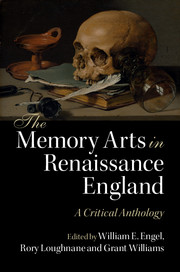Book contents
- Frontmatter
- Dedication
- Contents
- List of figures
- Acknowledgements
- A note on abbreviations
- Introduction
- PART I The art of memory
- PART II Rhetoric and poetics
- PART III Education and science
- PART IV History and philosophy
- PART V Religion and devotion
- PART VI Literature
- Introduction to Part VI
- POETRY
- VI.1 John Skelton, ‘Upon a Dead Man's Head’ (1527)
- VI.2 Edmund Spenser, The Faerie Queene (1590)
- VI.3 Anthony Sherley, Wit's New Dial (1604)
- VI.4 Richard Niccols, Mirror for Magistrates (1610)
- VI.5 Abraham Holland, ‘A Funeral Elegy’ (1626)
- VI.6 George Herbert, The Temple (1633)
- VI.7 Francis Quarles, Emblems (1635)
- VI.8 Mary Fage, Fame's Rule (1637)
- VI.9 Margaret Cavendish, selected works
- VI.10 John Milton, Paradise Lost (1674)
- PLAYS AND PROSE
- Index
- References
VI.5 - Abraham Holland, ‘A Funeral Elegy’ (1626)
from POETRY
Published online by Cambridge University Press: 05 August 2016
- Frontmatter
- Dedication
- Contents
- List of figures
- Acknowledgements
- A note on abbreviations
- Introduction
- PART I The art of memory
- PART II Rhetoric and poetics
- PART III Education and science
- PART IV History and philosophy
- PART V Religion and devotion
- PART VI Literature
- Introduction to Part VI
- POETRY
- VI.1 John Skelton, ‘Upon a Dead Man's Head’ (1527)
- VI.2 Edmund Spenser, The Faerie Queene (1590)
- VI.3 Anthony Sherley, Wit's New Dial (1604)
- VI.4 Richard Niccols, Mirror for Magistrates (1610)
- VI.5 Abraham Holland, ‘A Funeral Elegy’ (1626)
- VI.6 George Herbert, The Temple (1633)
- VI.7 Francis Quarles, Emblems (1635)
- VI.8 Mary Fage, Fame's Rule (1637)
- VI.9 Margaret Cavendish, selected works
- VI.10 John Milton, Paradise Lost (1674)
- PLAYS AND PROSE
- Index
- References
Summary
About the author
Abraham Holland (d. 1626), poet, Latinist and satirist, was educated at Trinity College, Cambridge (BA, 1617), and gained renown in the late Jacobean period in court circles as a distinguished poet. He was the son of Philemon Holland, a respected schoolmaster. Abraham's best-known poem is Naumachia (1622), a ‘poetical description of a bloody sea-fight’ (B1r), which borrows heavily from the depiction of the sea battle of Massilia in book 3 of Lucan's epic Pharsalia.
About the text
After Abraham's death, Henry published a collection of some of his brother's various writings at his own expense, entitled Hollandi posthuma. Henry went to this effort in part for the satisfaction of his brother's ‘endeared and worthy friends’. Like Naumachia, this work, the ‘labours of [his] deceased brother’, is also dedicated to the Earl of Enzie. Our excerpt derives from the first poem of the collection, an elegy written upon the death of James I. Holland begins the elegy by noting that some time has passed since the death of James (‘Now that the land hath night forgot to weep’), but begs the reader's pardon to ‘spend a tear’. The elegy, composed in rhyming couplets in pentameter, is an exuberant encomiastic celebration of the late king, which ‘salves’ the reader's misery with an equally spirited acclamation of his successor, Charles I. A typical example of Holland's hyperbole occurs when he laments the impossibility of his present exercise. He claims that even if there was a better modern poet than Homer and Virgil, such a ‘swan…could but meanly sing / And weakly tell what was our now-dead King’. For Holland, James I was ‘a man, a king, a God’.
The arts of memory
Throughout the elegy, Holland struggles to reconcile his two goals: to express his abundant, unending sorrow about the death of James, and his delight and wonder about Charles's succession. Such conflicted emotions are like a ‘strange monster bred, / Of joy and sorrow streaming from one head’. Holland suggests that the greatest miseries are now silenced by the ‘good omens’ and ‘glad acclamations’ that attend the saying of the name of Charles I. The art of memory is invoked as a practice that would little help the recollection of the sorrow of mourning in such joyous times. Yet, of course, in lavishly praising the dead, and recalling James, Holland's elegy denies the possibility of such oblivion.
- Type
- Chapter
- Information
- The Memory Arts in Renaissance EnglandA Critical Anthology, pp. 296 - 298Publisher: Cambridge University PressPrint publication year: 2016



